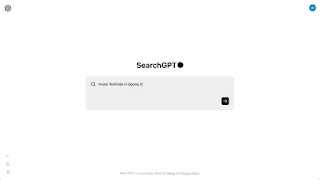 |
| OpenAI Enters Search Market with AI-Powered SearchGPT: Aiming to Revolutionize Search Engines Image credit: OpenAI |
OpenAI has launched SearchGPT, an AI-powered search engine prototype, marking the company's entry into the search engine market, long dominated by Google. SearchGPT is described on OpenAI's website as “a temporary prototype of new AI search features that provide fast and timely answers with clear and relevant sources.” The initial test phase will involve 10,000 users before integrating the product into ChatGPT based on feedback.
The launch of SearchGPT occurs in a competitive environment where Google has already started incorporating AI capabilities into its platform. Other startups, such as the Jeff Bezos-backed Perplexity, have positioned themselves as "answer engines" using AI to summarize web content. However, the rise of AI-powered search engines has sparked controversy. Last month, Perplexity faced criticism for summarizing articles from Forbes and Wired without proper attribution or backlinks and for ignoring the robots.txt protocol, which guides web crawlers on which content to avoid scraping. Condé Nast, the publisher of Wired, even issued a cease and desist letter to Perplexity, accusing it of plagiarism.
Amid these controversies, OpenAI seems to be adopting a more collaborative approach with SearchGPT. The company’s blog post highlights partnerships with various news organizations and includes endorsements from CEOs of The Atlantic and News Corp, with whom OpenAI has secured licensing deals. The blog states, “SearchGPT is designed to help users connect with publishers by prominently citing and linking to them in searches.” Responses in SearchGPT will feature clear, in-line, named attribution and links, allowing users to quickly access additional results in a sidebar with source links. Publishers will also have control over how their content appears in SearchGPT and can opt out of having their content used to train OpenAI's models while still being included in search results.
 |
| SearchGPT categorizes results with short descriptions and visuals Image credit: OpenAI |
SearchGPT's interface features a prominent textbox asking users, "What are you searching for?" Unlike traditional search engines that list links, SearchGPT categorizes results with short descriptions and visuals. For instance, a search for information about music festivals provides brief event descriptions and links for more details. However, some users have noted inaccuracies in the search results, indicating room for improvement.









0 Comments